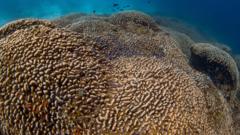The largest coral ever documented has been unearthed by scientists in the southwest Pacific Ocean, igniting excitement among environmentalists and offering a glimmer of hope in the fight against climate change. This colossal organism, made up of many interconnected polyps, measures an astonishing 34 meters wide, 32 meters long, and 5.5 meters high. Its discovery is not only remarkable due to its size but also because it is estimated to be over 300 years old.
The breakthrough moment occurred when videographer Manu San Felix, aboard a National Geographic expedition, stumbled upon the coral while diving. Initially searching for a shipwreck, he instead encountered a stunning underwater "cathedral" that left him with awe and respect for this ancient life form. "I thought, 'Wow, this was here when Napoleon was alive,'" he reflected on the experience.
Scientists measured the coral in deeper waters of the Solomon Islands, which may have shielded it from the adverse effects of climate change, unlike many shallower reefs suffering from rising ocean temperatures. The discovery coincided with the ongoing UN climate talks, COP29, in Baku, Azerbaijan, where policymakers grapple with finding solutions to battle climate change's impacts.
Trevor Manemahaga, the climate minister from the Solomon Islands, expressed pride at this finding, advocating for its protection. "We rely on marine resources for economic survival," he noted, highlighting the coral's critical role in supporting local tourism and fishing industries. However, small island nations like his are exceptionally vulnerable to climate change, and he lamented the increased frequency of powerful cyclones and coastal erosion affecting livelihoods.
Most of the nation's economy relies on logging, a practice that reportedly generates up to 70% of the country's annual export revenue but causes water pollution harmful to surrounding coral environments. Mr. Manemahaga calls for increased financial support from wealthier countries, emphasizing the importance of creating sustainable job opportunities beyond industries detrimental to coral reefs.
Scientists, including Eric Brown from National Geographic, are optimistic about the newfound coral's health. While less fortunate nearby reef areas have succumbed to warmer seas, this robust coral presents a beacon of hope amid concerning reports that 44% of warm-water corals face extinction, a stark rise since 2008.
The species of this immense coral is known as Pavona clavus, functioning as a habitat for various marine life, including shrimp, crabs, and fish. Its long lifespan serves as a historical window into past oceanic conditions, providing significant insights into marine ecosystem resilience and growth patterns in the wake of climate challenges.



















